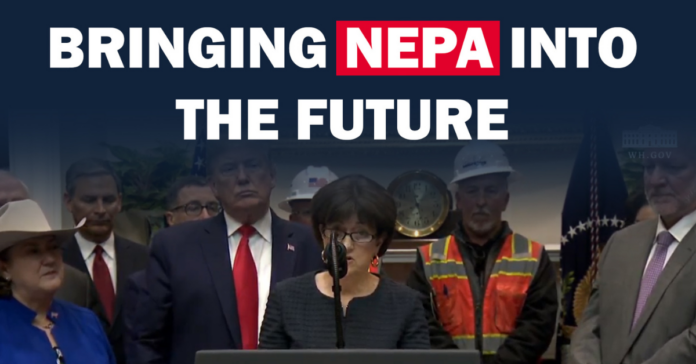In a speech in Washington on Thursday, President Donald Trump announced a proposal to modernize the National Environmental Policy Act (NEPA) to help complete new infrastructure projects. The proposed rule change would set a two-year deadline for completing environmental impact statements and a one-year deadline to complete environmental assessments and imposes page limits on environmental reviews.
“We want to build new roads, bridges, tunnels, highways, bigger, better fast, and we want to build them at less cost,” said Trump, who campaigned on a pledge to reinvest in American infrastructure, when announcing the change.
“Today it can take more than ten years to build just a very simple road,” he continued, adding, “and usually you’re not able to even get the permit.”
Currently, it takes nearly five years on average to complete an environmental impact statement and ballooning to seven years when for a highway.
Reform of the lengthy permitting process will save both time and money, says Kent Holsinger, a Denver attorney specializing in land and water law, who told Western Wire that environmentalist groups abuse the current NEPA regulations to stonewall projects.
“In today’s day and age, permitting and compliance can cost more and take longer than construction of the project itself. While teetering piles of paperwork may benefit lawyers and consultants, they impose tremendous societal costs and rob resources from where they are truly needed,” he said.
“NEPA has arguably led to more litigation than any other environmental law,” he continued. “It has a strong and vocal constituency of radical environmental groups that continually sue and settle. For example, our research shows the Center for Biological Diversity and WildEarth Guardians alone have filed in excess of 1,500 lawsuits against the federal government since 1990.”
Utah Rep. Bob Bishop, the ranking Republican on the House Natural Resources Committee, agreed, saying that reforms to the permitting process will help complete needed investments in transportation, energy, and water infrastructure.
“There has been nothing more detrimental to the development of transportation, clean water, and energy infrastructure than America’s broken environmental review and permitting process. Today, the Administration took another step forward in bringing logic and rationality to the federal bureaucracy,” he said. “Reducing redundancies, enhancing coordination with states and tribes, clarifying ambiguous terms, and establishing time frames for the completion of paperwork is the 20/20 vision we needed.”

National Cattlemens’ Beef Association President Jennifer Houston speaks at the NEPA announcement
The announcement garnered similar praise from lawmakers and industry figures from across the Mountain West, who see the changes as common-sense reforms that will help spur investment in aging infrastructure.
“These updates will reduce red tape so important infrastructure projects get done better, faster, cheaper, and smarter,” said Wyoming Sen. John Barrasso (R) after the speech. “Road and bridge safety projects that take months to build should not take years to permit. These regulatory updates promote safety and still protect America’s air, water, and communities.”
NEPA was originally passed in 1978 to assess the environmental impacts of proposed Federal actions and has received only one substantive amendment, in 1986. While originally intended to be a streamlined process to ensure clean air and water, in recent years, activists began using its provisions to hold up projects in litigation indefinitely. During the construction of the Dakota Access Pipeline, for example, legal fights over environmental impact statements dragged on for years.
Support for the change did not come only from the energy industry. NEPA’s role may be most visible during construction projects, but farmers and ranchers often undergo reviews when they renew term grazing permits, construct range improvements, or apply for USDA programs. These processes create an uncertain business environment for livestock producers, says the National Cattlemen’s Beef Association, which welcomed the announcement.
“These sensible updates proposed by Council on Environmental Quality (CEQ) are welcome news to ranching families whose businesses have been impacted by the overwhelming and growing costs of NEPA compliance,” said Oregon rancher and Public Lands Council President Bob Skinner.
However, environmental groups lamented the change, which they see as gutting a crucial environmental protection.
“While our world is burning, President Trump is adding fuel to the fire by taking away our right to be informed and to protect ourselves from irreparable harm,” said Gina McCarthy, president and CEO of the Natural Resources Defense Council.

